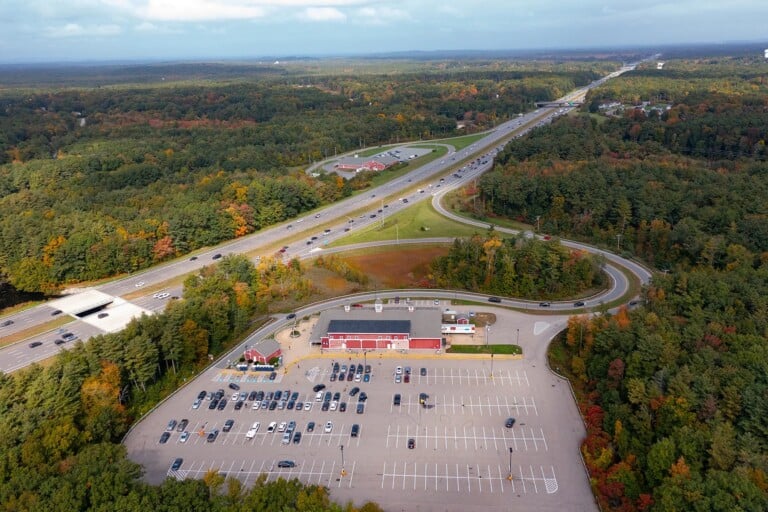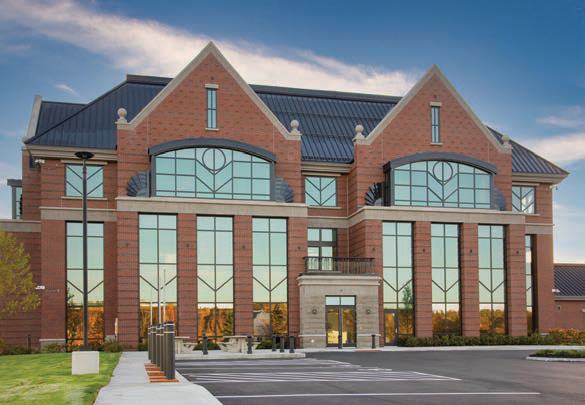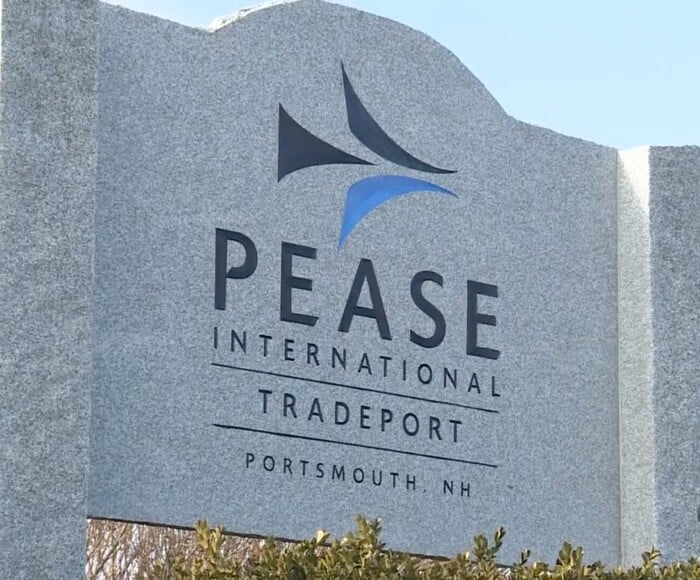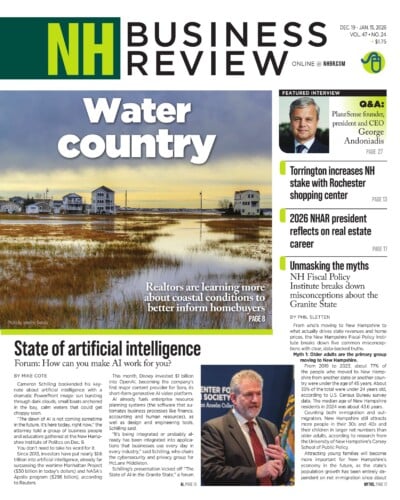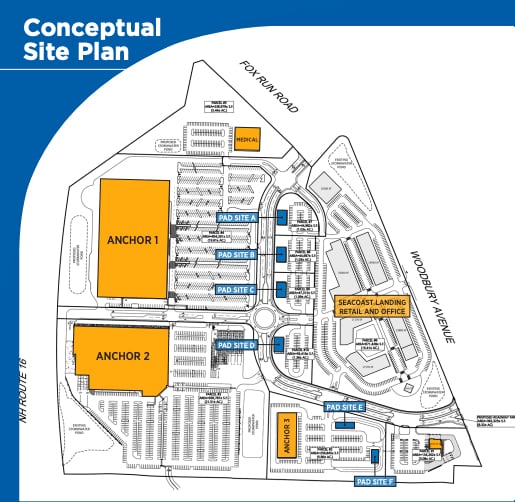
This aerial view shows the northbound N.H. Liquor & Wine Outlet on Interstate 95 (foreground) and the southbound outlet (background). (Courtesy photo)
The state will lease, rather than sell, the Interstate 95 welcome centers in Hampton for redevelopment.
It’s a win for the state of New Hampshire, which as owner and landlord of the property, will receive rent from whomever wins the bid to redevelop the sites on the northbound and southbound sides of the major highway.
And it’s a potential win for the town of Hampton, which, by statute, can collect property taxes on the newly constructed buildings, not otherwise owned by the state.
“Hampton has been a great partner to the state of New Hampshire and to the liquor commission,” said Executive Councilor Janet Stevens, R-Rye. Her district encompasses much of the Seacoast, including Hampton.
The state is now seeking proposals to enter a long-term lease and to construct and operate new service areas in conjunction with all-new state-owned and managed liquor stores that will be built on the sites.
The requests for proposals (RFPs) require that the new service areas’ architecture convey themes that reflect New Hampshire’s culture, history and visual aesthetics, emphasizing the state’s four-season tourism appeal.
Among the essential services it requires are fueling (a minimum of eight pumps), electric vehicle recharging, parking, restrooms, a visitor information center, a convenience store and more. Facilities will also have to provide locally or regionally branded food concepts and major branded or locally recognized fuel concepts.
Completed proposals must be returned to the Liquor Commission no later than 2:30 p.m. on Monday, February 16, 2026.
There are two parts to the construction element of the redevelopment project, according to the RFP requirements. One is construction of new, ground-level service area building(s) northbound and southbound accommodating the variety of food and travel service offerings outlined in the RFP. The service area buildings are required to be at least 16,000 square feet, not including liquor and wine outlets.
The outlets themselves are the second part of the construction element. The RFP requires that ground-level liquor and wine outlet buildings be at least 22,000 gross square feet each. The buildings will be purchased by the liquor commission for their operation.
Noting the liquor commission’s 90 year history, Liquor Commission Chairman Joseph Mollica said it “has delivered more than $4.7 billion in revenue to support essential state services through sales at our NH Liquor & Wine Outlets.”
In anticipation of a sale, in late 2022, the town of Hampton undertook a comprehensive rezoning of the property, creating an “interstate corridor overlay district” that allowed the uses typical of a service center.
The project to sell the property was originally hailed by the NH Liquor Commission as a “public-private partnership” for what it sees as 88 acres of “prime real estate” in Hampton. A March 18, 2024, media release from the commission cited the work among various stakeholders, including the town of Hampton, to create what Mollica described as “new and significant ongoing property tax revenue from the new privately held portion of the redeveloped areas.”
The governor at the time, Republican Christopher Sununu, hailed “even more economic opportunity for the Hampton area!”
But Ayotte, the Republican governor who replaced Sununu, had other ideas.
As proposals had already been filed and were being considered in May 2024, Ayotte pulled the rug out from under the process.
“I believe that leasing that property given how valuable it is, is very important when we think about long-term revenue for the state. It also allows the state to have more control over that location and what goes in there,” she said at the time.
The shift in emphasis concerned Stevens and Hampton officials, who, according to some estimates, were looking at about $1 million in tax revenue on the rezoned property from the redeveloped, privately owned properties.
“I raised that as a concern,” said Stevens, who coordinated meetings among herself, Hampton officials and Ayotte. She said concerns were alleviated by state assurances that a 2009 statute would be applicable, giving the town authority to assess and tax the property.
The RFP specifically states that the developer/operator will pay “all taxes, assessments and governmental charges of any kind” levied against the developer/operator’s leasehold interest. That would include the welcome center building(s), but not the liquor stores, which will be owned by the state.
In fact, the RFP states: “The Developer/Operator is not required to pay property tax on the liquor store buildings or land area under the liquor store buildings.”
It would be similar to the lease arrangement in Hooksett, where the Common Man Roadside operates the welcome centers it built on the north and southbound sides of Interstate 93 and pays property taxes to the town. The liquor stores there, too, are owned and operated by the state.
“My hope, in the end, is that this is a wonderful opportunity for New Hampshire not only to raise revenue but to do it in a way that promotes New Hampshire and New Hampshire vendors,” Ayotte said during her sit-down with the media after the Oct. 29 Executive Council meeting.
Describing the areas as “strategic locations,” Ayotte added: “One of the things I love about the way we have done the rest areas in New Hampshire is that it is a very New Hampshire solution. You go into the rest area and you can tell you are promoting New Hampshire. There is a visitor center right there and a person right there. You’ve got the liquor stores right there, but you also have a lot of New Hampshire products.”
Stevens said the current I-95 centers “are stressed; they’re tired.”
“We’re going to see great revenue coming out of there,” she said.
According to the liquor commission, the interstate that connects Massachusetts to the south and Maine to the north carries an average of 86,000 vehicles per day in both directions, with summertime peaks of over 125,000 vehicles per day.
Stevens said the current facilities there attract about 2% of traffic to stop in. She expects the new welcome centers/liquor stores combination to capture 14% of the traffic.
“Imagine the increased revenue when you transition from an absolutely underwhelming facility to something as modern and updated as the Portsmouth rotary,” said Stevens in reference to the liquor store opened in October 2018 after a renovation overhaul doubled its size to 22,000 square feet.
According to Stevens, the northbound store on I-95 ranks third in the state in overall liquor and wine sales, while the southbound store ranks fifth.
Currently, combined liquor/wine sales are down in New Hampshire.
For September, in the current fiscal year 2026 state budget, the NH Liquor Commission reported revenue totaled $9.7 million or $1.0 million (9.3%) below what was projected for the month and $0.5 million (4.9%) below prior year.
The monthly revenue statement from the state Department of Administrative Services noted: “According to the Liquor Commission, revenues are below plan due to the continued downward trend in alcohol sales.”
So far this fiscal year (which began July 1), NH Liquor Commission transfers to the General Fund are $3.1 million (13.4%) below plan and $6.4 million (24.2%) below the same year-to-date period last year.
As is her wont, Ayotte often takes digs at other states, such as Massachusetts, saying she doesn’t want to “Massup” the Granite State with such things as sales and property taxes. She took a dig at New Jersey when talking about service centers: “I also don’t want our rest areas to be like the Jersey turnpike; no disrespect to Jersey, but we have done this a different way,” she said.
Out of fairness to New Jersey, its turnpike rest areas are named for famous residents: Bon Jovi, Vince Lombardi, Walt Whitman, Thomas Edison and Clara Barton, to name a few. Each of the areas includes some text, photos and memorabilia associated with the celebrities.
